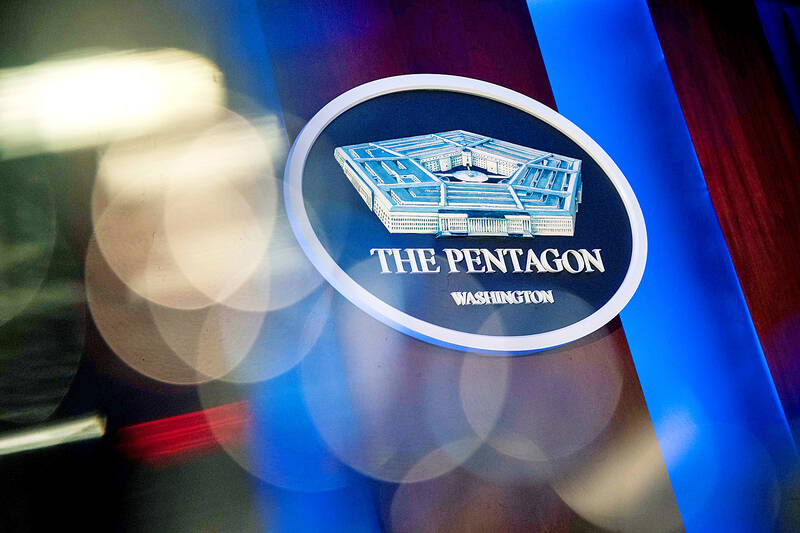The US Department of State has approved the potential sale of ammunition and logistics support to Taiwan in two separate deals with a combined value of up to US$440 million, the Pentagon said on Thursday.
Taiwan has asked to purchase 30mm ammunition, including high-explosive incendiary tracer rounds, multipurpose rounds and training rounds, for about US$332.2 million, the Pentagon said.
The principal contractors would be Alliant Techsystems Operations and General Dynamics, it said.

Photo: REUTERS
Taiwan has asked to buy a Blanket Order Cooperative Logistics Supply Support Arrangement at an estimated cost of US$108 million, the Pentagon said.
The logistics arrangement would support the purchase of spare and repair parts for wheeled vehicles, weapons and other equipment, it said.
The Pentagon’s Defense Security Cooperation Agency on Thursday notified the US Congress of the possible sales.
In Taipei, the Presidential Office thanked the US for honoring its commitments to Taiwan’s security by providing the nation with defensive weapons in accordance with the Taiwan Relations Act and the “six assurances,” Presidential Office spokeswoman Olivia Lin (林聿禪) said yesterday.
The arms sales “fully demonstrated that the US government attaches great importance to Taiwan’s national defense needs,” she said.
Taiwan would continue to demonstrate its determination to defend itself and strengthen its defense capabilities to safeguard the security and interests of the nation, she said.
Taiwan would continue to cooperate with like-minded countries to ensure peace, stability and prosperity in the Taiwan Strait and the Indo-Pacific region, she added.
The Ministry of National Defense said that the sales would boost the nation’s resilience against China’s “expanding threats of military and gray zone tactics,” which it said has posed “severe threats” to Taiwan.
The Ministry of Foreign Affairs also issued a statement to thank the US for the arms sales.
“Taiwan has an unwavering determination to defend itself in the face of China’s continued military expansion and provocative actions,” the ministry said.
Taiwan would continue to strengthen its self-defense capabilities while deepening its close security partnership with the US to jointly safeguard the rules-based international order, and ensure regional peace, stability and prosperity, it said.
Meanwhile, the defense ministry said that 11 Chinese military aircraft were detected crossing the median line of the Taiwan Strait yesterday morning.
At about 8am, 24 People’s Liberation Army (PLA) aircraft were spotted near Taiwan, and 11 of them crossed the unofficial border between Taiwan and China, the ministry said in a statement.
The 24 PLA aircraft included J-11, J-10 and J-16 jets, as well as Sukhoi Su-30s and H-6 bombers, it said.
The ministry said it scrambled planes to monitor the Chinese aircraft, issued radio warnings, mobilized combat air and naval patrols, and deployed defensive missile systems.
Five Chinese naval vessels were also detected near Taiwan yesterday, it said, without giving any details of the location or movement of the ships.
Additional reporting by Liu Tzu-hsuan

CHAOS: Iranians took to the streets playing celebratory music after reports of Khamenei’s death on Saturday, while mourners also gathered in Tehran yesterday Iranian Supreme Leader Ayatollah Ali Khamenei was killed in a major attack on Iran launched by Israel and the US, throwing the future of the Islamic republic into doubt and raising the risk of regional instability. Iranian state television and the state-run IRNA news agency announced the 86-year-old’s death early yesterday. US President Donald Trump said it gave Iranians their “greatest chance” to “take back” their country. The announcements came after a joint US and Israeli aerial bombardment that targeted Iranian military and governmental sites. Trump said the “heavy and pinpoint bombing” would continue through the week or as long

TRUST: The KMT said it respected the US’ timing and considerations, and hoped it would continue to honor its commitments to helping Taiwan bolster its defenses and deterrence US President Donald Trump is delaying a multibillion-dollar arms sale to Taiwan to ensure his visit to Beijing is successful, a New York Times report said. The weapons sales package has stalled in the US Department of State, the report said, citing US officials it did not identify. The White House has told agencies not to push forward ahead of Trump’s meeting with Chinese President Xi Jinping (習近平), it said. The two last month held a phone call to discuss trade and geopolitical flashpoints ahead of the summit. Xi raised the Taiwan issue and urged the US to handle arms sales to

BIG SPENDERS: Foreign investors bought the most Taiwan equities since 2005, signaling confidence that an AI boom would continue to benefit chipmakers Taiwan Semiconductor Manufacturing Co’s (TSMC, 台積電) market capitalization swelled to US$2 trillion for the first time following a 4.25 percent rally in its American depositary receipts (ADR) overnight, putting the world’s biggest contract chipmaker sixth on the list of the world’s biggest companies by market capitalization, just behind Amazon.com Inc. The site CompaniesMarketcap.com ranked TSMC ahead of Saudi Aramco and Meta Platforms Inc. The Taiwanese company’s ADRs on Tuesday surged to US$385.75 on the New York Stock Exchange, as strong demand for artificial intelligence (AI) applications led to chip supply constraints and boost revenue growth to record-breaking levels. Each TSMC ADR represents

Pro-democracy media tycoon Jimmy Lai’s (黎智英) fraud conviction and prison sentence were yesterday overturned by a Hong Kong court, in a surprise legal decision that comes soon after Lai was jailed for 20 years on a separate national security charge. Judges Jeremy Poon (潘兆初), Anthea Pang (彭寶琴) and Derek Pang (彭偉昌) said in the judgement that they allowed the appeal from Lai, and another defendant in the case, to proceed, as a lower court judge had “erred.” “The Court of Appeal gave them leave to appeal against their conviction, allowed their appeals, quashed the convictions and set aside the sentences,” the judges